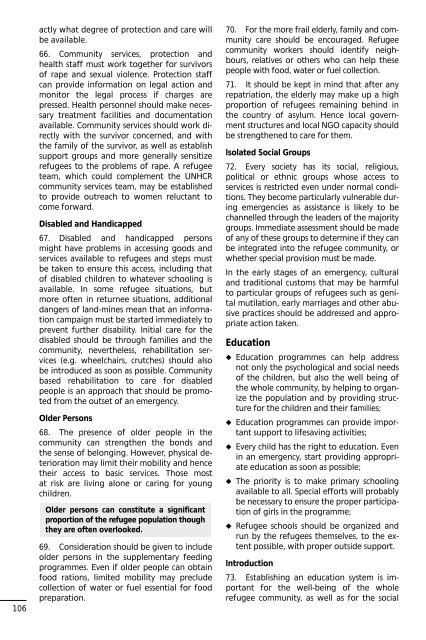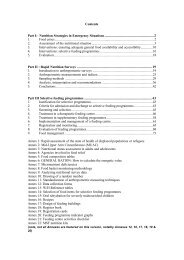UNHCR Handbook for Emergencies - UNHCR eCentre
UNHCR Handbook for Emergencies - UNHCR eCentre
UNHCR Handbook for Emergencies - UNHCR eCentre
Create successful ePaper yourself
Turn your PDF publications into a flip-book with our unique Google optimized e-Paper software.
106<br />
actly what degree of protection and care will<br />
be available.<br />
66. Community services, protection and<br />
health staff must work together <strong>for</strong> survivors<br />
of rape and sexual violence. Protection staff<br />
can provide in<strong>for</strong>mation on legal action and<br />
monitor the legal process if charges are<br />
pressed. Health personnel should make necessary<br />
treatment facilities and documentation<br />
available. Community services should work directly<br />
with the survivor concerned, and with<br />
the family of the survivor, as well as establish<br />
support groups and more generally sensitize<br />
refugees to the problems of rape. A refugee<br />
team, which could complement the <strong>UNHCR</strong><br />
community services team, may be established<br />
to provide outreach to women reluctant to<br />
come <strong>for</strong>ward.<br />
Disabled and Handicapped<br />
67. Disabled and handicapped persons<br />
might have problems in accessing goods and<br />
services available to refugees and steps must<br />
be taken to ensure this access, including that<br />
of disabled children to whatever schooling is<br />
available. In some refugee situations, but<br />
more often in returnee situations, additional<br />
dangers of land-mines mean that an in<strong>for</strong>mation<br />
campaign must be started immediately to<br />
prevent further disability. Initial care <strong>for</strong> the<br />
disabled should be through families and the<br />
community, nevertheless, rehabilitation services<br />
(e.g. wheelchairs, crutches) should also<br />
be introduced as soon as possible. Community<br />
based rehabilitation to care <strong>for</strong> disabled<br />
people is an approach that should be promoted<br />
from the outset of an emergency.<br />
Older Persons<br />
68. The presence of older people in the<br />
community can strengthen the bonds and<br />
the sense of belonging. However, physical deterioration<br />
may limit their mobility and hence<br />
their access to basic services. Those most<br />
at risk are living alone or caring <strong>for</strong> young<br />
children.<br />
Older persons can constitute a significant<br />
proportion of the refugee population though<br />
they are often overlooked.<br />
69. Consideration should be given to include<br />
older persons in the supplementary feeding<br />
programmes. Even if older people can obtain<br />
food rations, limited mobility may preclude<br />
collection of water or fuel essential <strong>for</strong> food<br />
preparation.<br />
70. For the more frail elderly, family and community<br />
care should be encouraged. Refugee<br />
community workers should identify neighbours,<br />
relatives or others who can help these<br />
people with food, water or fuel collection.<br />
71. It should be kept in mind that after any<br />
repatriation, the elderly may make up a high<br />
proportion of refugees remaining behind in<br />
the country of asylum. Hence local government<br />
structures and local NGO capacity should<br />
be strengthened to care <strong>for</strong> them.<br />
Isolated Social Groups<br />
72. Every society has its social, religious,<br />
political or ethnic groups whose access to<br />
services is restricted even under normal conditions.<br />
They become particularly vulnerable during<br />
emergencies as assistance is likely to be<br />
channelled through the leaders of the majority<br />
groups. Immediate assessment should be made<br />
of any of these groups to determine if they can<br />
be integrated into the refugee community, or<br />
whether special provision must be made.<br />
In the early stages of an emergency, cultural<br />
and traditional customs that may be harmful<br />
to particular groups of refugees such as genital<br />
mutilation, early marriages and other abusive<br />
practices should be addressed and appropriate<br />
action taken.<br />
Education<br />
◆ Education programmes can help address<br />
not only the psychological and social needs<br />
of the children, but also the well being of<br />
the whole community, by helping to organize<br />
the population and by providing structure<br />
<strong>for</strong> the children and their families;<br />
◆ Education programmes can provide important<br />
support to lifesaving activities;<br />
◆ Every child has the right to education. Even<br />
in an emergency, start providing appropriate<br />
education as soon as possible;<br />
◆ The priority is to make primary schooling<br />
available to all. Special ef<strong>for</strong>ts will probably<br />
be necessary to ensure the proper participation<br />
of girls in the programme;<br />
◆ Refugee schools should be organized and<br />
run by the refugees themselves, to the extent<br />
possible, with proper outside support.<br />
Introduction<br />
73. Establishing an education system is important<br />
<strong>for</strong> the well-being of the whole<br />
refugee community, as well as <strong>for</strong> the social



